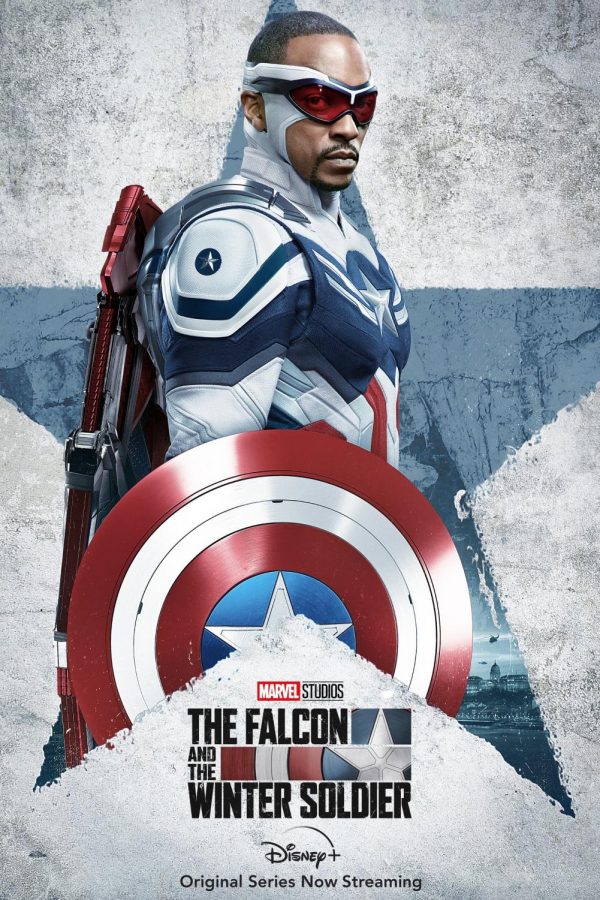“The Falcon and the Winter Soldier” fails to redefine what Captain America represents
Marvel presents Sam Wilson us the new Captain America, but doesn’t relay why we need him.
Well, typical Marvel content is back, for better or worse. After the delightfully off-the-wall “WandaVision,” “The Falcon and the Winter Soldier” is the second Disney+ show from Marvel Studios, this time giving a much more typical superhero narrative. While “WandaVision” had its problems, it still managed to give us one of the most original pieces of media in the Marvel Cinematic Universe, with themes of loss, regret and acceptance before devolving into standard superhero action in the finale. “The Falcon and the Winter Soldier” carries none of this poignancy. While it serves much different needs, delivering blockbuster action and buddy comedy antics in spades, any attempt it has in trying to say something deeper falls flat.
After a full year without superhero films, I suppose it was to be expected that a lot of Marvel’s worst tendencies would be rolled into one project, just waiting to be released. To be fair, there’s a lot of enjoyment to be gained from “The Falcon and the Winter Soldier,” which follows the titular two superheroes as they grapple with their new roles after Captain America’s retirement at the end of 2019’s “Avengers: Endgame.” It is this relationship between Sam Wilson, the Falcon, and Bucky Barnes, the Winter Soldier, that makes up the heart of the series as the two try to put aside their mutual animosity and focus on preserving the legacy of Steve Rogers, the former Captain America. With a sarcastic yet collected Wilson and a blunt but rage-filled Barnes, the pairing makes the ideal buddy comedy duo, with their interplay forming the emotional core of the series. Both have different visions of what Captain America should be and how the role of the hero should play in the future. This dynamic plays well with the character of John Walker, a soldier appointed by the U.S. government to be the new Captain America, shield and all. The conflict over the legacy of the shield, combined with Walker acting as an analogue of American imperialism and military overreach are effective, altogether making for a poignant metaphor about the potential paths facing America.
It’s a shame, then, that anything else the show tries to do ends up being completely surface-level, failing to effectively grapple with the nuances of the issues it tries to confront. Walker is a prime example of this, with his representativeness of the U.S. military’s results-oriented mentality falling to the wayside in the last two episodes, with a seeming redemption in the finale despite no confrontation of the deeper issues he embodies. This simple hand-waving away of issues is omnipresent throughout the show and is most notable when it comes to the show’s villain: Karli Morgenthau. Morgenthau acts as the leader of the Flag-Smashers, a globalist terrorist group that aims to bring an end to borders and prevent the relocation of refugees back to their home countries. I enjoy that the show is trying to relay the geopolitics of the Marvel Universe, but it ultimately isn’t effective due to the forced nature resolution. Wilson takes a sympathetic stance to Morgenthau, but never properly resolves his moral conflict or truly finds a true middle ground in the issue, leading to a confusing and rushed finale. Look, I’m all for superheroes yelling to politicians about morals, that’s the cheesiness I’m here for, but the solutions proposed actually have to make sense.
The same hand-waving resolutions are present in the core conceit of the series, which is ultimately to reckon with what an African American Captain America means. Throughout the show, Sam tries to reconcile with the fact that if he became Captain America, he’d be the representative of a nation that continues to discriminate against people like him. While there’s something in here about embracing erased history and moving in a new direction, it’s all contrived and ultimately nonsensical. Without a proper rebuttal of the idea that there can never be a true Black Captain America that doesn’t compromise some aspect of their identity, the show flounders and fails to provide a proper purpose for its own existence. There can be valid reasons for Sam taking up the shield, but they’re just not here in this series.
Ultimately, “The Falcon and the Winter Soldier” is a missed opportunity. The action and character moments are great, but the core planks of the series are altogether hollow. Superhero projects tend to fall into these traps, but it’s just unfortunate that after four phases and God knows how many films in, Marvel continues to mistake bringing up real-world issues with actually confronting them. The show may be trying to set a new path forward for what Captain America can mean, but without actually dealing with what that means, it’s letting both the character of Sam Wilson and the viewers down.

Shreyas (he/him) is a fourth-year student majoring in biology and philosophy. If he isn't yammering to you about how great "Pet Sounds" is or making bad...


